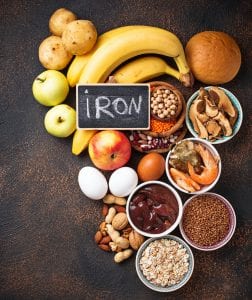Minerals like manganese, selenium, and iron are not just part of the periodic table but also your health. Learn how trace minerals can improve your health.
 For your body to operate at optimal levels, it needs minerals to carry out certain daily functions and processes.
For your body to operate at optimal levels, it needs minerals to carry out certain daily functions and processes.
In other words, they are essential for a body to function normally and healthily.
Lack of enough minerals (or too many) can lead to medical problems and disease.
Specifically, minerals have a great impact on pain, digestion, weight management, depression, blood pressure, PMS, and even cancer prevention.
The minerals most people are familiar with include calcium, potassium, sodium, sulfur, magnesium, and phosphorus.
However, trace minerals like iron, zinc, manganese, and selenium are also important, albeit in smaller quantities.
Essential Functions of Trace Minerals
Trace minerals can help facilitate a variety of chemical reactions and are crucial building blocks for hundreds of enzymes.
They serve as antioxidants, support the blood system, and are required for normal growth and development.
In addition, these minerals are necessary for normal gonadal development, certain hormones, and neurological functions.
The best way to consume these trace minerals is to eat the right plants, as they bring up minerals from the soil, or animals that eat those plants.
 The Most Important Trace Elements
The Most Important Trace Elements
Iron
A key component of various enzymes and proteins, iron helps in the formation of lean muscle and red blood cells.
Also, natural food sources for iron include dark leafy vegetables, poultry, red meat, and seafood.
Chromium
This trace mineral aids with glucose metabolism and insulin functions.
For example, a way to easily cover your chromium needs is to have a well-balanced diet of grains, meat, fruit, veggies, and fish.
Copper
Hemoglobin production, healthy connective tissue, energy production, and iron metabolism are some of the functions where copper is helpful.
Copper rich foods include whole grain, organ meats, nuts, and wheat bran cereals.
Zinc
Zinc is essential for the immune system, child development and growth, and various neurological functions. A diet consisting of cheese, almonds, cashews, yogurt, turkey, beef, milk, and dark-meat chicken is rich in this mineral.
Iodine
This trace element is a key part of the thyroid hormone.
To counteract iodine deficiency, many countries fortify their salt with it.
In addition, dietary iodine intake in the U.S. is substantially made up of grains, poultry, eggs, and dairy products.
Manganese
As an ingredient and facilitator in many enzymes with antioxidant properties, manganese helps support bone development, healing, and metabolic functions.
For example, diets including teas, leafy vegetables, nuts, and whole grains are rich in manganese.
Selenium
Selenium helps with thyroid hormone metabolism, reproduction, DNA synthesis, and oxidative damage protection.
The richest sources of selenium are organ meats and seafood, while grains, dairy products, and muscle meats are good sources as well.
In conclusion, a good source of various minerals is L-arginine Plus, helping boost nitric oxide levels and improving your heart health.

